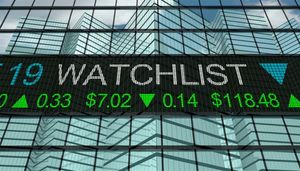
On October 27, 2025, Robinhood Markets (NASDAQ: HOOD) defied broader market trends by not just participating in a general rally, but by experiencing a substantial surge in its stock price. While global markets rejoiced over escalating optimism for a potential trade truce between the United States and China, Robinhood's impressive afternoon session jump was primarily fueled by a confluence of company-specific positive developments, including a significant analyst upgrade and strategic expansion initiatives. This robust performance underscores a pivotal moment for the popular trading platform, signaling strong investor confidence in its evolving business model and future growth trajectory.
Company-Specific Catalysts Drive Robinhood's Stellar Performance
Robinhood's shares skyrocketed by as much as 5% to 12% on October 27, 2025, positioning it as a top performer in the S&P 500. This dramatic ascent pushed its year-to-date growth to an astonishing 300%, with analysts projecting further upward movement. The immediate catalyst for this surge was a bullish report from Compass Point, which not only reiterated a "Buy" rating for HOOD but also significantly raised its price target from $105 to an ambitious $161 per share. This upgrade was underpinned by robust revenue growth observed across equity trades, crypto fees, and the surprisingly successful launch of its prediction markets.
Adding to the positive momentum, Robinhood announced plans to introduce futures trading to eligible customers in the United Kingdom in the coming weeks. This strategic expansion into a new international market and product offering, which will include access to over 40 CME Group futures products with a competitive $0.75 contract fee, is seen as a substantial new revenue stream and a testament to the company's diversification efforts. The move highlights Robinhood's ambition to broaden its appeal beyond its traditional U.S. retail investor base and tap into the lucrative derivatives market.
Furthermore, the company's nascent prediction markets feature, launched earlier in the year, emerged as a significant driver of investor enthusiasm. Estimates suggested that these markets generated approximately $20 million in revenue in the third quarter of 2025, more than doubling the prior quarter's figures. With the full NFL season underway, projections for the fourth quarter anticipated revenue from prediction markets to reach an impressive $50 million, signaling a powerful new growth engine for the platform. CEO Vlad Tenev reportedly noted that over two billion prediction contracts were issued in Q3 alone, underscoring the rapid adoption and engagement with this innovative offering. These company-specific triumphs occurred against a backdrop of a broader market rally, where optimism for a U.S.-China trade truce pushed major indices to record highs, creating an exceptionally favorable environment for strong individual stock performances.
Market Ripple Effects: Winners and Losers in a Shifting Landscape
The dual forces of a potential U.S.-China trade truce and Robinhood's (NASDAQ: HOOD) aggressive expansion are poised to send significant ripple effects across the financial services sector, creating a dynamic environment of both opportunity and heightened competition. The broader market optimism stemming from a trade truce is generally a boon for brokerages and fintechs, as reduced geopolitical uncertainty and improved economic outlook typically translate to increased trading volumes and investor confidence. Companies with substantial global market exposure, particularly multinational corporations in sectors like agriculture, technology, and automotive, stand to be major beneficiaries. Lower tariffs and smoother supply chains would directly boost their profit margins and operational efficiency. Fintechs specializing in cross-border payments and trade finance could also see a surge in demand as international trade flows normalize.
However, Robinhood's specific strategic moves introduce a more localized, yet equally powerful, competitive dynamic. The analyst upgrade not only validates Robinhood's disruptive, commission-free model but also intensifies pressure on incumbent players like Charles Schwab (NYSE: SCHW) and Fidelity. These traditional brokerages, already compelled to adapt to the commission-free trend, must now accelerate their digital transformation and innovate rapidly to retain market share, especially among younger, digitally-savvy investors. Those that successfully pivot to a hybrid model, combining low-cost trading with sophisticated advisory services and advanced technology, are better positioned to thrive. Conversely, firms slow to adapt risk losing clients to agile fintech platforms.
Robinhood's foray into UK futures trading presents a direct challenge to established UK brokerages and futures platforms. By offering access to over 40 CME Group futures products with a competitive $0.75 contract fee and a user-friendly interface, Robinhood aims to democratize a market traditionally dominated by institutional players. This move could significantly benefit UK retail investors by lowering barriers to entry and increasing access to complex financial instruments, while simultaneously forcing existing platforms to re-evaluate their fee structures and user experience. Meanwhile, the rapid growth of Robinhood's prediction markets creates both opportunities and threats for other fintechs. While it validates the potential of innovative, event-based contracts and could attract more investment into the broader fintech sector, it also intensifies competition. Traditional sports betting platforms, such as DraftKings (NASDAQ: DKNG) and FanDuel (OTCPK: GMVHF), might face increased competition if Robinhood's prediction markets are viewed as financial instruments that bypass some state-level gambling regulations, forcing them to innovate their offerings or risk losing a segment of speculative traders.
Wider Significance: Reshaping the Financial Landscape
Robinhood's (NASDAQ: HOOD) recent surge, propelled by its strategic maneuvers and the tailwinds of broader market optimism, signifies more than just a win for a single company; it represents a powerful acceleration of fundamental shifts within the fintech and brokerage industries. The company's trajectory embodies a pronounced trend towards a "super-app" model, where platforms evolve beyond a single service to offer a comprehensive suite of financial tools. Robinhood's expansion into wealth management, including retirement accounts and advisory services, alongside high-yield checking and savings accounts, positions it as a holistic financial ecosystem, challenging traditional banks and aiming to capture a greater "wallet share" from the next generation of investors.
This expansion also underscores the ongoing "democratization" of complex financial products. By simplifying access to instruments like futures and prediction markets, Robinhood continues to break down barriers that historically confined these offerings to institutional investors. This trend, coupled with significant investments in digital assets, including acquisitions like Bitstamp, and the integration of AI-driven personalization tools such as Robinhood Cortex, highlights the industry's embrace of technology to enhance user experience and analytical capabilities. Furthermore, Robinhood's evolving focus from meme stock trading to long-term wealth building, with an emphasis on retirement products, reflects a maturing market where even younger investors are seeking more robust financial planning tools.
The ripple effects of Robinhood's aggressive strategy are profound. Traditional brokerages, such as Charles Schwab (NYSE: SCHW) and Fidelity, face intensified pressure to innovate their platforms and service offerings to compete for digitally-savvy clients. Banks, too, are feeling the heat as Robinhood encroaches on their territory with integrated banking and advisory services. In the fintech space, Robinhood's success validates disruptive models but also compels other players to accelerate their offerings in areas like crypto and derivatives. Its foray into prediction markets, in particular, has put platforms like DraftKings (NASDAQ: DKNG) and FanDuel (OTCPK: GMVHF) on notice, blurring the lines between financial speculation and traditional gambling and potentially forcing a re-evaluation of market segmentation.
Regulatory bodies globally, including the CFTC in the U.S. and the FCA in the UK, are closely scrutinizing Robinhood's innovative products, especially prediction markets and crypto offerings. These new instruments challenge existing classifications and raise critical questions about consumer protection, market stability, and asset definition, likely necessitating new policy adjustments. The company's past operational challenges, like outages during the 2021 meme-stock frenzy, also reinforce regulators' focus on operational resilience, pre-trade risk controls, and cybersecurity, demanding robust compliance from all fintech players. Historically, periods of rapid financial innovation, such as the Dot-Com Bubble, have often preceded significant regulatory reforms, and the current fintech boom, particularly in novel areas, is poised to trigger further evolution in global financial regulations.
What Comes Next: Navigating Growth and Regulatory Frontiers
Robinhood's (NASDAQ: HOOD) recent market performance and strategic initiatives position it at a critical juncture, with both immediate opportunities and long-term evolutionary paths. In the short term (next 6-12 months), the company is poised for sustained growth, particularly from its nascent prediction markets and the rollout of futures trading in the UK. Positive analyst sentiment, reflected in elevated price targets, hinges on Robinhood delivering strong Q3 2025 earnings, scheduled for October 29, which are expected to showcase robust revenue generation from its diversified offerings. The maturation of its user base, evidenced by growing adoption of retirement accounts and its premium "Robinhood Gold" service, also signals a shift towards more stable, recurring revenue streams and a move beyond purely speculative trading demographics.
Looking further ahead (1-5 years), Robinhood's ambition to transform into a comprehensive financial "super-app" is a central theme. This involves an aggressive expansion of its wealth management solutions, deeper integration of cryptocurrency products, and the deployment of AI-driven trading tools to personalize user experience and enhance analytical capabilities. Increased international presence, particularly for its prediction markets and through strategic acquisitions, will be crucial for broadening its global footprint. The broader financial market is also expected to lean heavily into AI and automation, further democratizing sophisticated trading tools and potentially cementing Robinhood's leadership in retail futures and prediction markets.
However, this ambitious trajectory is not without its strategic pivots and adaptations. Paramount among these is navigating the complex and often divergent regulatory landscapes, especially concerning its prediction markets and crypto offerings which blur traditional financial and gambling classifications. Robinhood must engage proactively with regulators, such as the UK's Financial Conduct Authority (FCA), to shape favorable policy. Investing heavily in enhanced reliability and cybersecurity infrastructure is also critical to maintain user trust, particularly given past operational outages. The company will need to continue diversifying its revenue beyond commission-free trading, focusing on higher-margin services like subscriptions and net interest revenue, while strategically pursuing acquisitions and partnerships to accelerate its product and global expansion. Furthermore, as it offers more complex products, Robinhood bears the responsibility of providing robust educational tools and transparent risk management guidance to its growing retail investor base.
The market opportunities for Robinhood are vast, including the continued democratization of advanced trading tools, the demand for integrated financial ecosystems, the burgeoning potential of asset tokenization, and the power of social trading features to foster community and engagement. Yet, significant challenges loom. Intense competition from both established brokerages and agile fintech startups, coupled with ongoing regulatory scrutiny over business models like "payment for order flow," could pressure profit margins. Robinhood's pro-cyclical business model also makes it vulnerable to market volatility and potential downturns, which could dampen trading volumes. Finally, some analysts raise concerns about its current valuation, suggesting it might be susceptible to corrections if growth decelerates or earnings fail to meet lofty expectations, emphasizing the need for consistent execution in the coming months and years.
Comprehensive Wrap-up: Robinhood's Evolution and the Future of Fintech
Robinhood's (NASDAQ: HOOD) recent stock surge on October 27, 2025, represents a significant milestone, underscoring its successful pivot from a nascent trading app to a rapidly diversifying financial services platform. Key takeaways from this impressive rally include the robust growth driven by its expanded offerings in cryptocurrency, options trading, and especially its burgeoning prediction markets. Strong financial performance in Q2 2025, marked by substantial revenue and net income growth, coupled with renewed institutional confidence from firms like Ark Invest and numerous analyst upgrades, has fueled investor enthusiasm. Furthermore, increased user engagement, a surge in total platform assets, and its recent inclusion in the S&P 500 have cemented its position in the broader market. While some analysts express caution regarding its current valuation, the underlying operational strength is undeniable.
Moving forward, the market outlook for Robinhood remains largely optimistic. Analysts anticipate continued double-digit revenue growth, propelled by the global rollout of its prediction markets and further expansion into tokenized assets. Strategic acquisitions, such as WonderFi and Bitstamp, are expected to accelerate this growth trajectory, solidifying its vision as a "one-stop shop for building generational wealth." The broader financial market, meanwhile, is buoyed by a pervasive "risk-on" sentiment, largely driven by the optimism surrounding a potential U.S.-China trade truce and expectations of Federal Reserve interest rate cuts. This favorable macroeconomic backdrop creates a conducive environment for retail investment activity, indirectly benefiting platforms like Robinhood. However, the path ahead is not without its challenges, including high valuation, potential market downturns impacting retail participation, ongoing regulatory scrutiny, and intense competition.
The lasting significance of Robinhood's journey lies in its profound impact on democratizing access to financial markets. It has fundamentally reshaped how individuals, particularly younger demographics, engage with investing, evolving into a comprehensive financial ecosystem designed to cater to a new generation of wealth builders. This strategic evolution positions Robinhood at the epicenter of a historic wealth transfer, fundamentally altering the landscape of retail finance.
For investors, the coming months will be critical. Closely monitor Robinhood's Q3 2025 earnings report, scheduled for November 5, for insights into the performance of its prediction markets and crypto offerings. Watch for continued product diversification, particularly its international expansion efforts in Europe and Asia, and key metrics such as user engagement, total platform assets, and the growth of its premium "Robinhood Gold" subscribers. The evolving regulatory environment, especially concerning new financial instruments and the "payment for order flow" model, will also be a crucial factor. Lastly, keep an eye on the broader U.S.-China trade relationship; while a truce provides short-term stability, the underlying strategic competition could reintroduce volatility, influencing overall market sentiment and retail trading activity. Robinhood's ability to navigate these complexities while consistently innovating will determine its sustained success in the dynamic world of digital finance.
This content is intended for informational purposes only and is not financial advice





